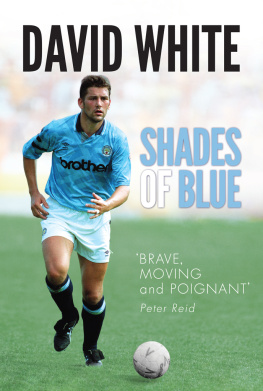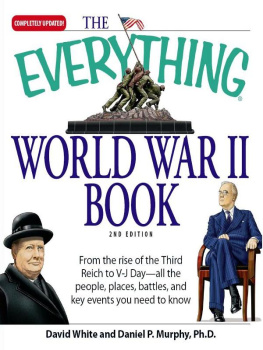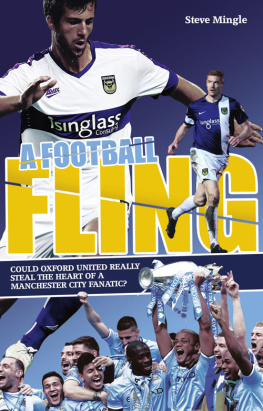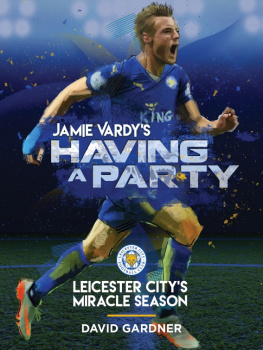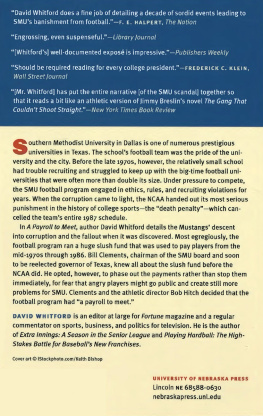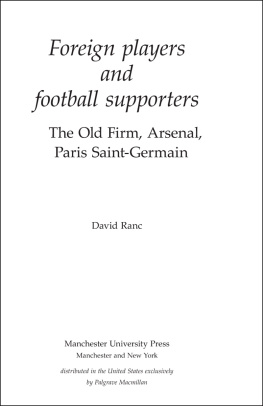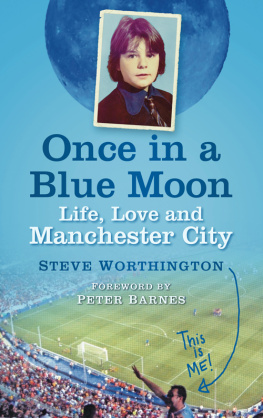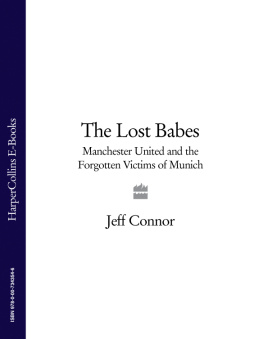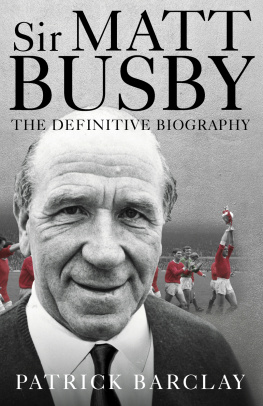About the Authors
DAVID WHITE was born on 30 October 1967 in Manchester, England. A former professional footballer, he played as a forward from 1986 to 1997. He is best remembered for his eight-year spell at Manchester City. He also played for Leeds and Sheffield United, and was capped once by England.
JOANNE LAKE is the co-author of the Sunday Times bestseller Im Not Really Here, the story of footballer Paul Lakes fight against injury and depression. She has since collaborated with World Cup referee Howard Webb on his autobiography, The Man in the Middle.
First published in Great Britain in 2017 by
Michael OMara Books Limited
9 Lion Yard
Tremadoc Road
London SW4 7NQ
Copyright White Reclamation Limited 2017
All rights reserved. You may not copy, store, distribute, transmit, reproduce or otherwise make available this publication (or any part of it) in any form, or by any means (electronic, digital, optical, mechanical, photocopying, recording or otherwise), without the prior written permission of the publisher. Any person who does any unauthorized act in relation to this publication may be liable to criminal prosecution and civil claims for damages.
A CIP catalogue record for this book is available from the British Library.
ISBN: 978-1-78243-770-3 in hardback print format
ISBN: 978-1-78243-782-6 in trade paperback print format
ISBN: 978-1-78243-772-7 in e-book format
www.mombooks.com
Follow us on Twitter @OMaraBooks
Every reasonable effort has been made to acknowledge all copyright holders. Any errors or omissions that may have occurred are inadvertent, and anyone with any copyright queries is invited to write to the publisher, so that full acknowledgement may be included in subsequent editions of the work.
Cover design by Claire Cater
To Tony Skip Book,
who was a true inspiration to me, and who will forever remain my footballing hero.
To Glyn Pardoe,
whose ability shamed us all into becoming better players.
To Howard Kendall,
who deployed better footballers around me and simplified my game.
To Peter Reid and Sam Ellis,
who were hugely influential and made me feel irreplaceable.
To Dad,
who would have gone to any length to get me up that ladder.
Contents
David White and I go back a long, long way. I first became aware of him when I played for Everton in the mid-to-late 1980s, when I couldnt help but notice the presence of this powerful and pacey teenage winger, who posed a constant threat to his opponents. I really admired Davids direct way of playing, epitomized by an extraordinary ability to gain half a yard on a defender before unleashing a perfectly weighted cross into the box. It was clear that this was a footballer with a great deal of raw, natural talent, and something told me that hed go far in the game.
Whitie was still fairly young when I arrived at Manchester City as a thirty-four-year-old in 1990, but it was obvious that he had huge potential as a top-flight professional. Hed experienced a meteoric rise through the clubs ranks, a product of Citys fantastic youth team policy (spearheaded by Tony Book), which had reared similarly talented home-grown players like Andy Hinchcliffe, Steve Redmond and Ian Brightwell. David was undoubtedly one of Manchester Citys shining lights as a lifelong Blue himself, his love for the team and the shirt was plain to see and I know that our manager at the time, the great Howard Kendall, thought the world of him.
I recall travelling down to Villa Park on 23 April 1991, and that night witnessing one of the most superb performances Id ever seen from a forward. By then Id replaced Howard in the hot seat, becoming Citys playermanager, and occasionally Id switch David from the right to the centre, to mix things up a bit. Id opted to put Whitie up front in a striking position and he was simply unbelievable, verging on unstoppable. Our number 7s finish was truly brilliant, his four-goal tally helping us to a 51 victory and forcing a lot of people in the football world to sit up and take notice. Theyd all been aware of Whities famous turn of speed, but his accuracy in front of the goal that night, against a very good Aston Villa side, was just beautiful to watch.
I found David a delightful person to work with. He had an extremely dry sense of humour always useful at City and was a charming, polite and well-rounded individual, the sort of lad youd have been happy for your daughter to bring home. He came from a lovely family, too; I was lucky to meet his dad, Stewart, on a number of occasions and it was clear to see how much he adored his hugely talented son, as well as the club that had nurtured him over the years.
After he bid farewell to Manchester City, I continued to track Whities career, although it was sad to see his ankle injury blighting his progress at Leeds United and Sheffield United. This was, unfortunately, the main contributory factor towards his somewhat premature retirement from the game.
More recently, of course, David has attracted recognition for altogether different reasons. He, among other brave ex-professionals, has shown great courage in coming forward to publicly reveal his childhood trauma, and he has my utmost respect for doing so. It must have been hard enough to make the grade as a top professional footballer without shouldering the burden of such emotional heartache, and the fact that David somehow summoned the strength to continue playing top-level football even gaining international honours shows a remarkable depth of character. I applaud David for his honesty and candour including the writing of this book and hope that his openness will help to raise awareness of vitally important child protection and safeguarding issues.
Not only is David White a tremendous person, he is one of the finest footballers that I ever had the pleasure of playing alongside and managing. He brought so much joy to thousands of supporters during his career particularly those of the sky-blue variety and Id like to wish him nothing but the best for the future.
Light rain was falling when I sauntered out of the Shirecliffe training ground. I stopped for a moment to switch over the strap of my kitbag to my left shoulder, reducing the burden on my troublesome right ankle which, this particular afternoon, was causing me to wince with every step.
As per usual, a couple of United fans were lingering outside the main entrance, sporting their red-and-white-striped scarves.
All right, David? they grinned, offering me their autograph books.
Hiya, lads, I replied, obliging with my usual loopy scrawl.
Saw you jogging around the pitch before, mate. Reckon youll be back in the squad soon?
Ah, the big question.
You never know, I smiled, unconvincingly.
I didnt want to tell them that, the way things were going, Id be lucky to get first-team football at Hereford United, let alone Sheffield United. Despite countless operations, my ankle wasnt getting any better, and my game was suffering as a result. The lightning pace and the pinpoint crosses that had been my hallmarks at Manchester City and, for a time, at Leeds United, had been blunted. My confidence on the pitch I now dreaded kicking a football, such was my fear of the pain had been dented. Sometimes it was hard to believe that, just five years earlier, Id turned out for England. Times had indeed changed.
Dyou mind if we have a quick photograph, David?
Sure.
I posed for the snap, shook the lads hands and headed over to the players car park. As I did so, my phone rang. I lowered my kitbag onto the gravel and reached for the Nokia vibrating inside my tracksuit pocket.

